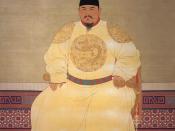Throughout modern history, there has been much debate about the reasons for the sudden and abrupt cessation of tributary voyages which had once been led by Zheng He under the rule of the Ming Dynasty. These voyages were an integral part of the dynasty and indeed symbolised the sheer scale of the success and prosperity of that empire. But all was not well, and it was the cessation of these voyages likewise that represented the troubles facing the dynasty as a whole.
According to many, the most mitigating factor in stopping the voyages was the sheer scale of costs involved in the expeditions and with an increasing preoccupation with defending the North against the Mongols, it became increasingly important to channel resources more productively into Northern Defenses instead of "tens of myriads of grain and money" being lost, according to Liu Daxia, vice president of the Ministry of War.
Opposition at the court is also regarded as being a contributing factor, as conservative officials believed the philosophy of encouraging expansion and commercialism were contrary to Chinese ideas of government. Pressure from the then powerful Neo-Confucian bureaucracy undoubtedly led to a restoration of a strict agrarian-centered society. There was much opposition to the expeditions "and moreover the people who met their deaths may be counted in the myriads" said Liu.
Under this philosophy, it was heralded that the stability of the Ming dynasty, which was without major disruptions of the economy, arts, society or politics during its reign, promoted a belief among the Chinese that they had achieved the most superior civilisation on earth and that nothing foreign was needed or welcome, beginning an entirely new chapter in China's history.
It is clear that Admiral Zheng and his contemporaries' voyages were stopped because of changes of priority in the...


